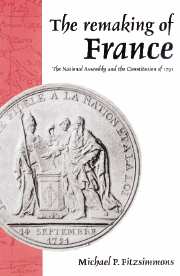Book contents
- Frontmatter
- Contents
- Preface
- List of abbreviations
- Part one
- 1 The crisis of the Old Regime
- 2 The formation of the new ideal of the polity
- 3 The achievement of the new ideal of the polity
- 4 The new ideal of the polity reaffirmed
- Part two
- Conclusion
- Appendix
- Bibliographical note and list of manuscript sources
- Index
4 - The new ideal of the polity reaffirmed
Published online by Cambridge University Press: 14 October 2009
- Frontmatter
- Contents
- Preface
- List of abbreviations
- Part one
- 1 The crisis of the Old Regime
- 2 The formation of the new ideal of the polity
- 3 The achievement of the new ideal of the polity
- 4 The new ideal of the polity reaffirmed
- Part two
- Conclusion
- Appendix
- Bibliographical note and list of manuscript sources
- Index
Summary
I accept, then, the Constitution; I will promise to maintain it … I declare that, informed of the adhesion that the great majority of the people give to the Constitution, I will renounce at the meeting what I asked for in the work and, being responsible only to the nation, no one else, when I renounce it, will have the right to complain.
Letter of Louis to the National Assembly, September 13, 1791On Tuesday, June 21, 1791, as the secretary prepared to read the procèsverbal, the president of the National Assembly, Alexandre de Beauharnais, took the floor to announce to its astonished members that at eight o'clock that morning the mayor of Paris had appeared at Beauharnais's residence to apprise him of the departure of the king and the royal family. Thus began an episode that would become one of the finest hours of the National Assembly, yet would also precipitate some of its least defensible actions. The crisis provoked by the king's flight cast a pall over the completion of the constitution, vitiated somewhat its grandeur – if not its moral force – and resulted in an awkward and anticlimactic conclusion to the Assembly's work.
The National Assembly had good reason to be puzzled and surprised. The sense of common purpose arising from the Fête de la Fédération had generated a strong sense of affection for the monarch and maintained belief in a unity of outlook that Louis had only recently reaffirmed.
- Type
- Chapter
- Information
- The Remaking of FranceThe National Assembly and the Constitution of 1791, pp. 111 - 140Publisher: Cambridge University PressPrint publication year: 1994



